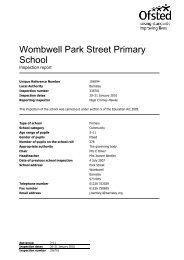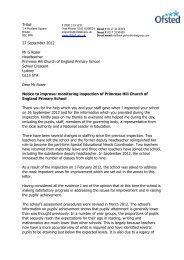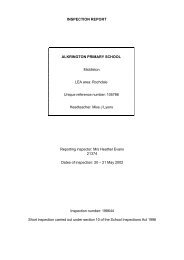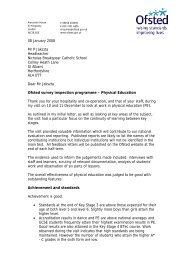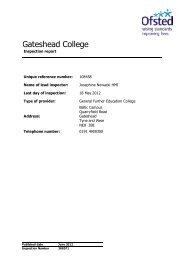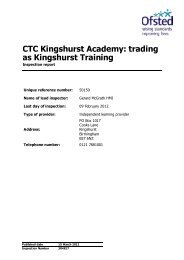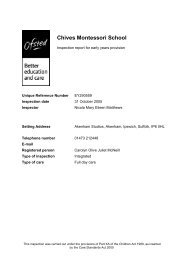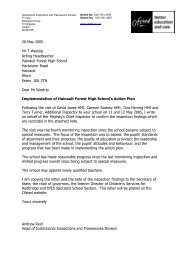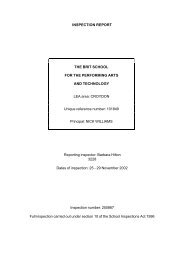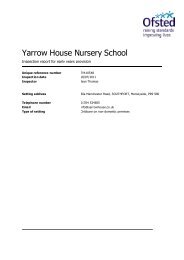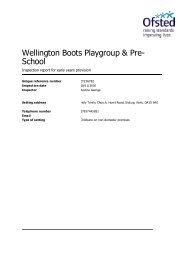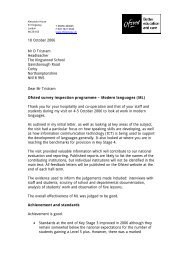2 April 2008 Mr Mario Citro The Headteacher Pent Valley ... - Ofsted
2 April 2008 Mr Mario Citro The Headteacher Pent Valley ... - Ofsted
2 April 2008 Mr Mario Citro The Headteacher Pent Valley ... - Ofsted
Create successful ePaper yourself
Turn your PDF publications into a flip-book with our unique Google optimized e-Paper software.
Tribal Group<br />
1 – 4 Portland<br />
Square<br />
Bristol<br />
BS2 8RR<br />
T 0845 123 6001<br />
F 0845 123 6002<br />
2 <strong>April</strong> <strong>2008</strong><br />
<strong>Mr</strong> <strong>Mario</strong> <strong>Citro</strong><br />
<strong>The</strong> <strong>Headteacher</strong><br />
<strong>Pent</strong> <strong>Valley</strong> School<br />
Surrendon Road<br />
Folkestone<br />
Kent CT19 4ED<br />
Dear <strong>Mr</strong> <strong>Citro</strong><br />
<strong>Ofsted</strong> monitoring of Grade 3 schools<br />
Thank you for the help which you and your staff gave when I inspected your school<br />
on 26 March <strong>2008</strong>, for the time you gave to our phone discussions, and for the<br />
information which you provided before and during my visit. Could you also thank the<br />
chair and vice-chair of governors as well as the students for their contributions?<br />
This letter will be posted on the <strong>Ofsted</strong> website. Please inform the Regional<br />
Inspection Service Provider of any factual inaccuracies within 24 hours of the receipt<br />
of this letter.<br />
As a result of the inspection on 6 and 7 February 2007, the school was asked to:<br />
� ensure that the curriculum and other activities better match the range of needs<br />
and interests of all learners<br />
� raise standards in English and mathematics so that students are well prepared for<br />
their future employment<br />
� ensure that the PSHE programme covers all aspects of personal development and<br />
well-being.<br />
Having considered all the evidence, I am of the opinion that at this time the school is<br />
making satisfactory progress in addressing the issues for improvement and in raising<br />
the students’ achievement.<br />
A clear direction from senior leaders has enabled the school to implement many<br />
strategies to tackle the areas for improvement identified at the last inspection.<br />
Effective changes to the curriculum in Years 7 to 11 have resulted in an increased<br />
breadth of provision. In Year 7, students now undertake a project based curriculum,<br />
which integrates the subjects of mathematics, geography and history and is enabling<br />
them to develop their independent learning skills. <strong>The</strong> introduction of a ‘learning to<br />
learn’ curriculum for students identified with additional educational needs, including<br />
profound and moderate learning difficulties, improves their access to the Key Stage 3<br />
curriculum by providing support for literacy and other specific needs. Choices<br />
available to students at the end of Year 9 have greatly improved. In partnership with<br />
Version 1 – September 2007<br />
T 08456 40 40 40<br />
enquiries@ofsted.gov.uk<br />
www.ofsted.gov.uk<br />
Page 1 of 2
other local institutions, the school provides a good range of appropriate pathways<br />
where students can elect subjects or programmes that include work based learning<br />
and apprenticeships. <strong>The</strong> literacy strategy, which has been recently introduced into<br />
most year groups, is yet to have an impact on the standards of literacy in lessons.<br />
In 2007, the school directed its attention to raising standards at Key Stage 4, which<br />
resulted in a rise in the proportion of students achieving five or more A* to C grades<br />
in GCSE examinations. Between 2004 and 2006, students’ attainment was<br />
significantly below the national average; the dramatic rise in 2007 has brought the<br />
school nearer to the national level. <strong>The</strong> proportion of students achieving five or more<br />
A* to C grades including mathematics and English has shown a slight improvement,<br />
although this remains significantly below the national average. Leaders have<br />
identified intervention strategies to improve standards in both these subjects. Early<br />
examination entry in GCSE English has enabled the school to target more closely<br />
underachieving students or to allocate more time for students to attain GCSE<br />
mathematics. <strong>The</strong> school’s data for <strong>2008</strong> indicates that students’ attainment at GCSE,<br />
including English and mathematics, is set to rise further, and the school is set to<br />
achieve its challenging targets. <strong>The</strong> proportion of students achieving five or more<br />
GCSE grades at A* to G has improved and is now significantly above the national<br />
average. <strong>The</strong> progress students make by the end of Key Stage 4 significantly<br />
improved in 2007, and is now good. In 2007, Key Stage 3 results did not improve on<br />
the previous year. <strong>The</strong> school is now testing students earlier in Year 9, and is<br />
providing a range of support programmes for those who are underachieving.<br />
<strong>The</strong> progress the school has made to improve the personal, social and health<br />
education (PSHE) programme is satisfactory; it now covers all aspects of personal<br />
development and well-being. All students have a lesson covering religious education,<br />
PSHE and citizenship. <strong>The</strong> programme meets statutory requirements and is enhanced<br />
by a good range of extra-curricular provision and visits to enhance students’ social<br />
and cultural development. As a result, students are aware of leading safe and<br />
healthy lifestyles. Many, but not all, participate in sport. <strong>The</strong>y enjoy school and make<br />
good progress by the end of Key Stage 4. <strong>The</strong> school provides a good range of<br />
opportunities for all students to make a positive contribution to the school and local<br />
community. For example, 100 students in Year 10 engage in weekly community<br />
based learning ranging from sports coaching in primary schools and working<br />
alongside students from a local special school, to conservation work with the local<br />
authority. Increased provision for work related learning, work experience and careers<br />
education, together with innovative work in information and communication<br />
technology, help to prepare the students well for their future economic well-being.<br />
<strong>The</strong> school recognises the need to develop further their skills in literacy and<br />
numeracy.<br />
I hope that you have found the visit helpful in promoting improvement in your<br />
school.<br />
Yours sincerely<br />
Samantha Morgan-Price<br />
Her Majesty’s Inspector<br />
Page 2 of 2



